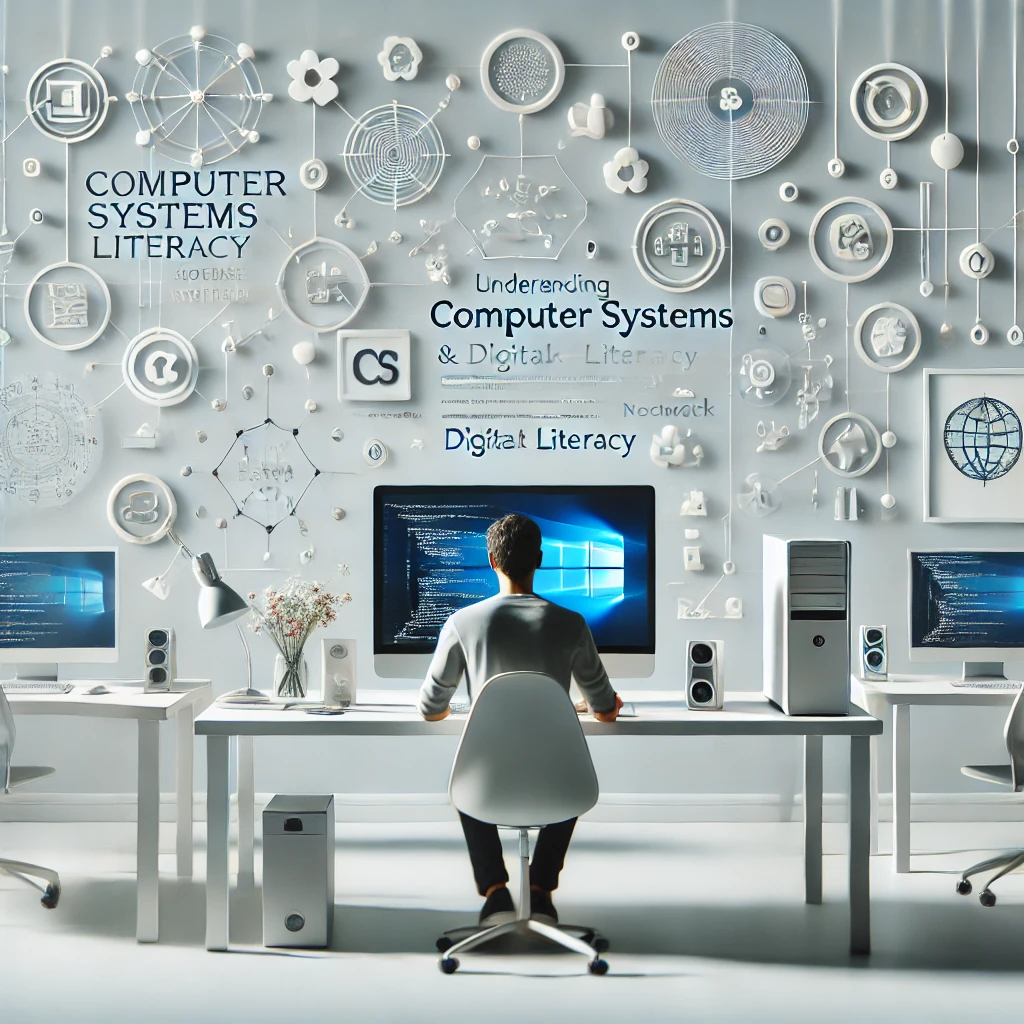The digital era requires modern life activities to use computer systems during both personal and workplace duties. Modern society depends on computers and digital technologies to perform all important daily tasks including communication, entertainment, work, and teaching activities. Modern society needs computer system literacy as a basic required skill that spans across almost all career spheres.
Computer system literacy describes the distinct capability to use hardware and software components alongside digital networking technologies effectively. People who have this skill can effectively move through the digital environment, boosting their productivity, improving their problem-solving methods, and creating a secure environment.
This blog explains the definition of computer system literacy, discusses its value, and provides methods to build these vital abilities.
What is Computer System Literacy?
To be computer system literate, one needs to grasp how computers operate through both hardware physical devices and software applications and operating systems that power current computing landscapes. People need this base knowledge to function productively and securely when using computers both in their education, at work, and during their personal time.
Computer system literacy consists of three essential aspects:
- Basic Hardware Knowledge: Understanding the fundamental components of a computer, such as the CPU, RAM, storage devices, input/output devices, and their functions.
- Users must have skillful knowledge in operating system platforms (for instance Windows, macOS, and Linux) alongside application software programs (such as word processors, spreadsheets, and presentation platforms).
- People who understand Operating Systems and File Management comprehend system operations and file organization structures along with their capacity to fix simple system problems.
- The student should learn to navigate Internet security while performing research and communication and entertainment tasks using browser fundamentals and search engine knowledge.
- Security and Privacy: People who understand online safety work through password maintenance, data security techniques, safe connectivity methods, and malware and phishing protection awareness.
One should be able to solve standard computer problems that include software breakdowns, hardware faults, and network connection problems.
The Importance of Computer System Literacy
Every person today requires computer system literacy beyond IT specialists as a fundamental skill for modern life. Computer system literacy demand has risen considerably because businesses need it for their technological dependency in every sector.
Enhancing Workplace Productivity
Not only does basic computer system literacy help work output in most professions, but it also becomes crucial for daily task execution. The framework of contemporary workflows depends on computer systems since employees need these systems to use email, create documents, and handle databases.
Employees who feel confident with computers work better, resolve challenges rapidly, and maintain smooth connections with their peers.
Work efficiency improves alongside error reduction when employees understand techniques to store, retrieve, and handle data through digital platforms.
The workplace demands personnel who demonstrate competence with email, along with skills using instant messaging while mastering video conference tools and collaboration software tools for effective communication.
The computer skills of employees enable them to use productivity software, which helps automate repetitive duties while they concentrate on essential tasks.
Increasing Access to Information and Education
The knowledge of computer systems makes it possible to access extensive information in the digital world. All educational resources available through digital libraries and online courses, as well as internet content, can be accessible to those who possess computer skills.
Computer literate people can access both webinars and online courses and tutorials, which help them develop new skills across disciplines including coding, data analysis, and graphic design.
Users who have mastery over search engines, academic databases, and digital libraries can execute research easily while accessing valid educational materials.
Computer literacy plays an essential role for people of all ages, particularly among younger groups and senior citizens. The skill provides digital readiness to those in their youth who need it to enter the workforce, but enables older individuals to remain engaged through digital connectivity.
Improving Digital Security
The sophistication of cyber threats requires people to master data protection methods both personally and for their organizations. A digitally competent person has higher chances of identifying and steering clear of basic cyber threats found in phishing attacks, malware attacks, and identity theft attempts.
Secure internet behavior can be achieved by developing the ability to build robust passwords, activate two-step verification, and identify dubious communication platforms.
Students must develop awareness about data sharing online to protect their personal information while strengthening control over privacy settings for data protection.
Your knowledge about secure internet habits that involve choosing safe networks and avoiding dangerous websites will decrease your chances of cyberattacks.
Boosting Personal Development and Confidence
Computer system literacy develops personal skills as well as practical advantages. Knowledge and confidence when using technology enable people to actively participate in contemporary social circumstances. Computer skills enable people to connect with others more easily while staying informed about modern digital trends through both socializing activities or work purposes.
Users who learn to use digital tools will enhance their personal organization through social media platforms and productivity apps, which also help them track mental health conditions.
People who understand computer systems acquire confidence to navigate digital technology because they no longer feel fearful when using digital tools in various settings.
How to Improve Your Computer System Literacy
Since anyone, regardless of their current knowledge, can improve their computer system literacy, the skill improvement continues throughout time. These realistic steps will help you build your computer system knowledge:
Start with the Basics
For beginners in computer use, start with the basic knowledge of computer system elements and their operational connection. All users should learn the fundamentals of their computer operating systems, which could be Windows, macOS, or Linux, through practice with core tasks that include file management, folder creation, and word processor usage.
Understand the fundamental attributes of all hardware components starting with the central processing unit (CPU), random access memory (RAM), hard drives, and external peripherals including keyboard and mouse.
Devote time to learn how your OS interface works and why it functions that way, and also review file system management skills, including normal issue resolution.
Take Online Courses and Tutorials
The Internet provides numerous resources that enable people to build their computer system literacy skills. Online learning platforms such as Coursera, Udemy, and Khan Academy present structured courses from fundamental to advanced levels for users who want to learn about computer basics, internet direction, cybersecurity methods, and programming skills.
A wide array of free tutorials are accessible through both YouTube platforms and dedicated online databases that focus on digital learning.
You can attain more extensive course knowledge by joining directed instructional programs. Free certifications exist on certain platforms, providing professionals the chance to develop their credentials.
Stay Updated with Technology
Modern technology develops at a quick pace, so one must learn about fresh software, functional upgrades, and workplace tools. Users who want current information about technology must read tech blogs and take part in webinars, along with joining online communities.
The latest technological developments and industry trends are provided through TechCrunch, Wired, CNET, and other comparable tech news websites.
Students should join Stack Overflow and Reddit to become part of active tech forums where they can talk with other learners and professionals.
Practice, Practice, Practice
Practical experience stands as the most effective method for developing your computer system literacy skills. Examine new applications by practicing various software tools and handle technical problems independently. The greater your technology interaction becomes, the more comfortable you will be with its use.
Test a range of software applications because each program enables a different functional role such as word processing, spreadsheet management, or design programs.
Before you ask for help with technical issues, you should attempt to solve them on your own. Developing your problem-solving talents will be possible through this experience.
The Importance of Computer System Literacy Leads to Professional Triumph
Modern society requires computer system literacy at such a basic level that it has transformed from an option to an absolute requirement. Usage of computer system literacy enables people to handle advanced technological systems while at the same time improving efficiency at work, strengthening online protection, and fostering overall personal growth. All individuals, from students to professionals and retired persons, need to improve their computer system literacy skills to succeed in the connected digital world.
Advancing your knowledge of computer systems and digital tools through modern technological changes leads to fresh prospects in life and improved personal and professional outcomes and superior performance in digital-connected environments.
FAQ
What does being computer system literate mean?
Computer system literacy enables users to effectively operate computers combined with software and hardware, alongside internet navigation skills for executing various tasks while defending their personal information.
What vital role does computer system literacy play?
The ability to understand computer systems holds essential benefits for productivity enhancement, digital security strengthening, information access improvements, and personal confidence growth when operating in digital spaces.
What steps should I take to enhance my computer system literacy?
The improvement of your computer skills requires online educational materials and consistent practice with contemporary technology knowledge and autonomous problem-solving for your computer issues.
Does everyone need to demonstrate proficiency with computers in their work?
The present employment market requires fundamental computer literacy across most occupations because digital communication tools, word processors, and spreadsheets must be mastered.
How can computer system literacy boost my career potential?
Absolutely! The technological know-how of computers serves as a fundamental requirement for most employment sectors because it both exposes fresh professional possibilities and strengthens job execution abilities while preserving job competitiveness.





